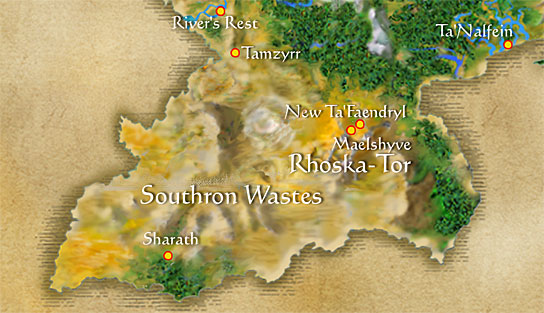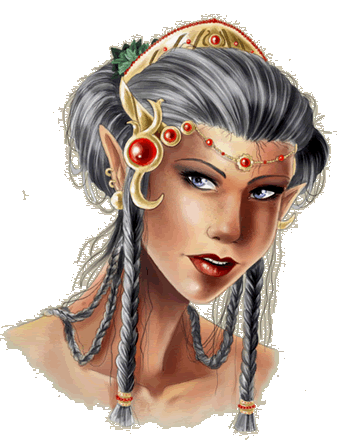|
<<
PREVIOUS • Tomes of Elanthia
• NEXT >>
VII. The Rebuilding (25,000 - 20,000
years ago)
VIII. The Dhe'nar Empire (20,000 years ago
to present)
IX. The Dhe'nar in Recent Times (150 years
ago to present)
Appendix A: The Dhe'nar Psyche

VII. The Rebuilding
(25,000 - 20,000 years ago)
Within the rubble of the fallen city, the Dhe'nar survivors
found the entrance to Shialos du S'karli. They committed the
information in the books to memory, reciting the verses over
and over so that they could pass the information down through
the generations, that it would never be lost again.
Realizing their true heritage, once again the Dhe'nar begin
to rebuild. The Great Mountain and the maze of caverns underneath
become their home. Because of their small numbers, they developed
the stealth and merciless raiding parties that later became
a hallmark of their society. They learned to take slaves to
augment the worker caste. Slowly the government was restored
to power, this time with a group, the Obsidian Council, to
guide the way.
Under new rule and with renewed vigor and sense of purpose,
the Dhe'nar rebuilt their homeland, and grew in power and
purpose. To this day the Dhe'nar remain undefeated in battle,
and they have never forgotten what Noi'sho'rah taught them,
or the promises they make to themselves each day.
The Dhe'nar walk with power.
VIII. The Dhe'nar Empire
(20,000 years ago to present)
 The
Dhe'nar continued to expand their empire, conquering nearby
villages of humans and dwarves and taking prisoners to use
as slaves. The Dhe'nar temple ensured that the bloodlines
were kept pure by placing restrictions on breeding, making
sure that each child was pure and powerful, lest it be sacrificed
for the good of the Dhe'nar. Pride grew stronger than ever
in the Dhe'nar people, and the belief that the other races
were inferior took a stronger hold among the Dhe'nar. They
believed that they were the true children of the Arkati, destined
to the same power possessed by the ancient gods. Each caste
developed more power and worked to further themselves to the
same goals. The
Dhe'nar continued to expand their empire, conquering nearby
villages of humans and dwarves and taking prisoners to use
as slaves. The Dhe'nar temple ensured that the bloodlines
were kept pure by placing restrictions on breeding, making
sure that each child was pure and powerful, lest it be sacrificed
for the good of the Dhe'nar. Pride grew stronger than ever
in the Dhe'nar people, and the belief that the other races
were inferior took a stronger hold among the Dhe'nar. They
believed that they were the true children of the Arkati, destined
to the same power possessed by the ancient gods. Each caste
developed more power and worked to further themselves to the
same goals.
The selection process for finding priests and magi became
the backbone of the Dhe'nar society. Each potential member
underwent scrutinizing and occasionally deadly tests in a
process to determine who was worthy of the two castes.
IX. The Dhe'nar in Recent
Times (150 years ago to present)
About one-hundred-fifty years ago, the first Dhe'nar were
seen in Wehnimer's Landing. Many thought them to be either
Faendryl or simply renegades. In time, the people of Wehnimer's
Landing found this to be far from the truth. While most Dhe'nar
had learned the common tongue, and some the elven tongue,
and made contact with the other races, it was easy to see
that the Dhe'nar people stuck together. They were, and are,
a tight-knit group that has an established structure very
similar to the far-away government in Sharath, the Forest
of Ash.
Appendix A: The Dhe'nar
Psyche
The Dhe'nar view the split of the elves into the seven separate
Houses to be the downfall of the elves from the very beginning.
To them, unity and the practice of Arkati self-enlightenment
are the goals to which everyone must stride to achieve. They
believe the bickering and quarreling among the elven houses
is petty, and refuse to take any part in it or the political
games it creates. When the Dhe'nar left the elven nation,
they left forever, believing the others to have betrayed the
Arkatis' teachings. The Dhe'nar have no emotion or pity for
the other elves, nor do they admit they have anything to do
with the remaining six elven Houses.
The Dhe'nar believe that Noi'sho'rah was a true prophet,
and that he now dwells with the Arkati. Noi'sho'rah taught
them that the elves are the children of the Arkati, and as
a child strives to become as its parents, the Dhe'nar strive
to become as the Arkati. Much like the elves, however, the
Dhe'nar do not view the Arkati so much as "gods"
or "celestial beings" but more as role models for
what they themselves can achieve. Unlike the elves of the
six noble Houses, however, the Dhe'nar believe they can become
as powerful as the Arkati. They do not see the Arkati as different
or better, only more powerful, thus Dhe'nar bow to no "god".
Their religion is not one of worship; instead it is one of
self-perfection, not so much as an individual, but as a race
in whole; the ultimate goal being to achieve power over all
things.
Over 50,000 years of hardship have scarred the Dhe'nar, forging
and twisting their ancient beliefs into what they are now.
They are an elitist race. Time has convinced them that the
other races are inferior; nothing more than pawns to be used
to their own ends. The Dhe'nar have long been hunters, survivalists,
and warriors. 50,000 years of fighting for survival has taken
its toll on the Dhe'nar psyche, however. The Dhe'nar at battle
are a gruesome sight. They seem to want to torture and punish
their prey, savoring the pain they inflict which each kill.
The Dhe'nar do not believe in the concept of "good"
and "evil". They believe in survival, they believe
in power. They hold true to the philosophy, "to be strong
is to survive, to be weak is to perish". It is to be
noted that simple survival is not enough for the Dhe'nar,
thus they constantly strive to better themselves in their
quest for power. This belief is shared with the great Drakes
of ancient times, and has long endured. While history is very
important, a Dhe'nar scholar does not waste time brooding
over such concepts like good and evil or spend their days
asking "why", but rather they ask "how".
|




 The
Dhe'nar continued to expand their empire, conquering nearby
villages of humans and dwarves and taking prisoners to use
as slaves. The Dhe'nar temple ensured that the bloodlines
were kept pure by placing restrictions on breeding, making
sure that each child was pure and powerful, lest it be sacrificed
for the good of the Dhe'nar. Pride grew stronger than ever
in the Dhe'nar people, and the belief that the other races
were inferior took a stronger hold among the Dhe'nar. They
believed that they were the true children of the Arkati, destined
to the same power possessed by the ancient gods. Each caste
developed more power and worked to further themselves to the
same goals.
The
Dhe'nar continued to expand their empire, conquering nearby
villages of humans and dwarves and taking prisoners to use
as slaves. The Dhe'nar temple ensured that the bloodlines
were kept pure by placing restrictions on breeding, making
sure that each child was pure and powerful, lest it be sacrificed
for the good of the Dhe'nar. Pride grew stronger than ever
in the Dhe'nar people, and the belief that the other races
were inferior took a stronger hold among the Dhe'nar. They
believed that they were the true children of the Arkati, destined
to the same power possessed by the ancient gods. Each caste
developed more power and worked to further themselves to the
same goals.